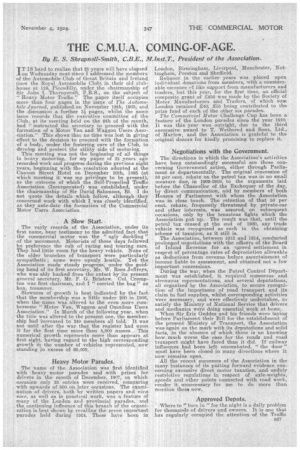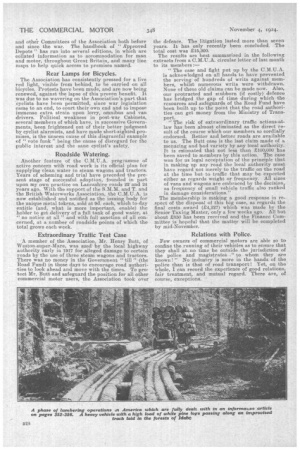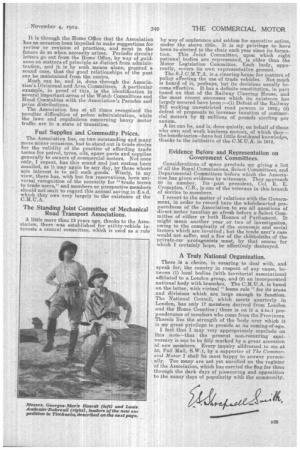THE C.M.U.A. COMING-OF-AGE.
Page 11

Page 12

Page 13

If you've noticed an error in this article please click here to report it so we can fix it.
By E. S. Shrapnell-Smith, C.B.E., 111.Inst.T., President of the Association.
TT IS hard to realize that 21 years will have elapsed -ion Wednesday next since I addressed the members of the Automobile Club of Great Britain and Ireland (now the Royal Automobile Club) in their old clubhouse at 119, Piccadilly, under the chairmanship of Sir John I. Thornyeroft, F.R.S., on the subject of "Heavy Motor Traffic." The paper itself occupies more than four pages in the issue of The Automobile Journal, published on November 12th, 1903, and the discussion a further aj pages, whilst the same issue records that the executive committee of the Club, at its meeting held on the 9th of the month, had instructed the secretary to proceed with the formation of a Motor Van and Waggon Users Association." This shows that no time was lost in giving effect to the decision to proceed with the formation of a body, under the fostering care of the Club, to develop and protect the utility side of motoring. This meeting was riot the beginning of all things in heavy motoring, for my paper of 21 years ago recorded work and progress during the previous eight years, beginning with the resolution adopted at the Cannon Street Hotel on December 10th, 1895 (at which meeting it was my privilege to be present), as the outcome of which the Self-Propelled Traffic Association (Incorporated) was established, under the chairmanship of Sir David Salomons, Bt. I do not quote the details which follow, although they concerned work with which I was closely identified, as they ante-date the formation of the Commercial Motor Users Association.
A Slow Start.
The early records of the Association, under its first name, bear testimony to the admitted fact. that the commercial motor was the "ugly duckling" of the movement. Motorists of those days followed by preference the cult of racing and touring cars. They. had little room for the heavy vehicle. None of the older branches of transport were particularly sympathetic ; some were openly hostile. Yet the Association made steady progress, under the guiding hand of its first secretary, Mr. W. Rees Jeffreys, who was ably backed from the outset by its present general secretary:, Mr. F. G. Bristow. Col. Crompton was first chairman, and I "carried the bag" as hon. treasurer.
Slowness of growth is best indicated by the fact that the membership was a little under 200 in 1006, when the name was altered to the even more cumbersome "Motor Van, Waggon and Omnibus Users Association." In March of the following year, -when the title was altered to the present one, the membership had increased to 249 members all told. It was not until after the war that the register had unon it for the first time more than 5,000 names. This numerical growth represents more than appears at first sight, having regard to the high corresponding growth iis the number of vehicles represented, now standing in excess of 60,000.
. Heavy Motor Parades.
The •name of the Association was first identified with • heavy motor parades and with prizes for drivers in the month of December, 1907, on which occasion only 23 entries were received, comparing with upwards of 500 on later oceasions. The examination of drivers, both by written papers and viva voce, as well as in practical work, was a feature of many . of the London and provincial parades, and the continuing influence of this branch of the organization is best shown by recalling the seven important parades held during 1924. These have been in
London, Birmingham, Liverpool, Manchester, Nottingham, Preston and Sheffield. Reliance in the earlier years was placed upon individual donations from members, with a considerable measure of like support from manufacturers and traders, but this year, for the first time, an official composite grant of £250 was made by the Society of Motor Manufacturers and Traders, of which sum. London retained £40, £35 being contributed to the prize fund of each of the other six parades. The Commercial Motor Challenge Cup has been a feature of the London parades since the year 1910. It was this year won outright, due to the third successive award to T. Wethered and Sons, Ltd., of Marlow, and the Association is grateful to the original donors for kindly promising to replace it.
Negotiations with the Government.
The directions in which the Association's activities have been outstandingly successful are those concerning Government action, either through Parliament or departmentally. The original concession of 50 per cent, rebate on the petrol tax was in 110 small measure due, in 1909-1910, to the arguments laid before the Chancellor of. the Exchequer of the day, by direct communication, and by members of both Houses of Parliament with whom the Association was in close touch. The retention of that 50 per cent. rebate, frequently threatened by private-ear and other interests, was assured, on subsequent occasions, only by the tenacious fights Which the Association put up. The result was that, until the petrol tax ceased at the end of 1920, any trade vehicle was recognized as such in the obtaining scheme of taxation, as it still is, The Association, between 1912 and 1914, conducted prolonged negotiations with the officers of the Board of inland Revenue for an egreed settlement in respect of percentage rates of depreciation allowable as deductions from revenue before ascertainment of income liable to assessment, and obtained not a few important concessions.
During the war, when the Petrol Control Department was established, it required numerous and strenuous representations, and several deputations, all organized by the Association, to secure recognition of the importance of road transport and its claim to fuel supplies, whilst corresponding activities were necessary, and were effectively undertaken, to satisfy the Ministry of National Service that drivers and mechanics were doing essential work at home.
When Sir Eric Geddes and his friends were laying before Parliament their Bill for the establishment of the present Ministry of Transport, the Association was again on the mark with its deputations and solid facts, in the absence of which there is no knowing how much worse the case for the roads and road transport might have fared than it did. If railway influences had been left uncombated, "the door" must have been closed in many directions where it now remains open. All the recent successes of the Association in the many instances of its putting forward evidence concerning excessive direct motor taxation, and unduly restrictive regulations in respect of axle-weights, speeds and other points connected with road work, render it unnecessary for me to do more than mention their. now.
Approved Depots.
Where to "turn in "for the night is a daily problem for thousands of drivers and owners. It is one that has regularly occupied the attention of the Traffic 1327
and otheir Committees of the Association both before and since the war. The handbook of "Approved Depots " has run into several editions, in which are collated information as to accommodation for man and motor, throughout Great Britain, and many line maps to help quick access to premises named.
Rear Lamps for Bicycles.
The Association has consistently pressed for a live red light, visible from behind, to be carried on all bicycles. Protests have been made, and are now being renewed, against the lapse of this proven benefit. It was due to no wavering on the Association's part that cyclists have been permitted, since war legislation came to an end, to court their own end and to impose immense extra strain upon lorry, omnibus and van drivers. Political weakness in post-war Cabinets, several members of which have, in successive Governments, been frightened out of their better judgment by cyclist alarmists, and have made short-sighted promises, is the unseen cause of this disgraceful example of "vote funk" being the cause of disregard for the public interest and the sane cyclist's safety.
Roadside Watering.
Another feature of the C.M.U.A, programme of active concern with road work is its official plan for supplying clean water to steam wagons and tractors. Years of scheming and trial have preceded the present stage of successful adoption, founded in part upon my own practice on Lancashire roads 22 and 24 years ago. With the support of the S.M.M. and T. and the British Waterworks Association, the C.M.U.A. is now established and notified as the issuing body for . the unique metal tokens, sold at 9d. each, which to-day entitle (and, what is more important, enable) the holder to get delivery of a full tank of good water, at " no notice at all " and with full sanction of all concerned, at a number of roadside points of which the total grows each week.
Extraordinary Traffic Test Case
A member of the Association, Mr. Henry Butt, of Weston-super-Mare, was sued by the local highway authority early in 1917 for alleged damage to certain roads by the use of three steam wagons and tractors. There was no money in the Government " till " (the Road Fund) in those days to encourage road authorities to look ahead and move with the times. To protect Mr. Butt and safeguard the position for all other commercial motor users, the Association took over the defence. The litigation lasted more than seven years. It has only recently been concluded. The total cost was 215,300. The results are best summarized in the following extracts from a C.M,U.A. circular letter of last month to its members :— " The case and fight put up by the C.M.U.A. is acknowledged on all hands to have prevented the serving of hundreds of writs against members, whilst numerous writs were withdrawn. None of these old claims can be made now. Also, our protracted and stubborn (if costly) defence has bridged the gap of time during which the resources and safeguards of the Road Fund have been built up to the point that the road authorities can get money from the Ministry of Transport. " The risk of extraordinary traffic actions-atlaw has been almost eliminated as the direct result of the course which our members so cordially endorsed. Better and better roads are available to us. The Butt ease is the last claim made of a menacing and bad variety by any local authority. It is estimated that not less than 2100,000 has been saved to members by this action. The case won for us legal acceptation of the principle that in making up any road the local authority must have regard not merely to the traffic on the road at the time but to traffic that may be expected either as regards weight or frequency. All sizes of vans and wagons are embraced by the decision, as frequency of small vehicle traffic also ranked in damage considerations."
The membership is making a good response in respect of the disposal of this big case, as regards the final costs award (24,227) which was made by the Senior Taxing Master, only a few weeks ago. All but about 2850 has been received and the Finance Committee is hopeful that the matter will be completed by mid-November.
Relations with Police.
Few owners of commercial motors are able so to confine the running of their vehicles as to ensure that they shall at no time be outside the jurisdiction of the police and magistrates ," to whom they are known!" No industry is more in the hands of the police than is that of road transport! Yet, on the whole' I can record the experience of good relations, fair treatment, and mutual regard.There are, of course, exceptions.
It is through the Home Office that the Association has on occasion been impelled to make suggestions for review or revision of practices, and must in the future do so when necessity arises. Periodic circular letters go out from the Home Office, by way of guidance on matters of principle as distinct from administration, and it is by such means alone, granted a sound case, that the good relationships of the past can be maintained from the centre.
Much can be, and is, done through the Association's Divisional and Area Committees. A particular example, in proof of this, is the identification in several important areas of the Watch Committees and Head Constables with the Association's Parades and prize distributions.
The Association has at all times recognized the peculiar difficulties of police administration, while the laws and regulations concerning heavy motor traffic are in a state of transition.
Fuel Supplies and Commodity Prices.
The Association has, on two outstanding and many more minor occasions, had to stand out in trade circles for the validity of the practice of affording trade terms for petrol, tyres, oils, spare parts and supplies generally to owners of commercial motors. Not once only, I repeat, has this sound and just custom been assailed, as it may again be any day, by those whose sole interest is to sell such goods. Wisely, in my view, there has, with but few reservations, been universal recognition of the necessity for "trade terms to trade users.," and members or prospective members should not omit to regard this annual saving in £.s.d. which they owe very largely to the existence of the C.M.U.A.
The Standing Joint Committee of Mechanical Road Transport Associations.
A little more than 12 years ago, thanks to the Association, there was established for utility-vehicle interests a central committee, which is used as a rule
Evidence Before and Representation on • Government Committees.
Considerations of space preclude my giving a list of all the Royal Commissions, Select Committees, and Departmental Committees before which the Association has given evidence by witnesses. They approach 20 in number. Its past president, Col. R. E. Crompton, C.13., is one of the veterans in this branch of service to members.
I revert to the matter of relations with the Government, in order to record here the wholehearted preparedness of the Association to see all questions of direct motor taxation go afresh before a Select Committee of either or both Houses of Parliament. It might mean another year or two of investigation. owing to the complexity of the economic and social factors which are involved ; but the trade user's case would not suffer, and a few of the shibboleths of the private-car protagonists must, by that course for which I certainly hope, be effectively destroyed.
A Truly National Organization.
There is a choice, in essaying to deal with, and speak for, the country in respect of any cause, between (1) local bodies (with territorial associations) affiliated to a London group, and (2) an incorporated national body with branches. The C.M.U.A. is based on the latter, with virtual "home rule" for its areas and divisions which are large enough to function. The National Council, which meets quarterly in London, has only 17 members derived from London and the Home Counties ; there is on it a 4-to-1 preponderance of members who come from the Provinces. Therein lies the strength of the body over which it is my great privilege to preside at its coming-of-age.
I feel that I may very appropriately conclude on this note—that the present non-recurring anniversary is one to be fitly marked by a great accession of new members. Every inquiry addressed to me at 50, Pall Mall, S.W.1, by a supporter of The Commercial Motor I shall be most happy to answer personally. Too many are not yet enrolled on the register of the Association, which has carried the flag for them through the dark days of pioneering and opposition to the sunny days of popularity with the community.
by way of conference and seldom for executive action, under the above title. It is my privilege to have been re-elected to the chair each year since its formation. This Joint Committee, upon which eight national bodies are represented, is older than the Motor Legislation Committee. Each body, apparently, covers its own representative ground.
The S.J.C.M.T.A. is a clearing-house for matters of policy affecting the use of trade vehicles. Not much is heard of it, perhaps, but its decisions usually become effective. It has a definite constitution, in part based on that of the Railway Clearing House, and the most recent successes which its existence has largely ecured have been :—(1) Defeat of the Railway Bill seeking unrestricted road powers in 1922; (2) defeat of proposals to increase taxation of commercial motors by 24 millions of pounds sterling per annum.
A lot can be, and is, done quietly, on behalf of those who own and work businesa motors, of which they— the beneficiaries—have but little first-hand knowledge, thanks to the initiative of the C.M.U.A. in 1912.
































